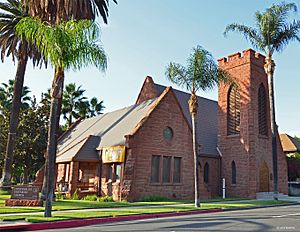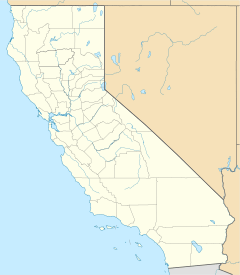Universalist Unitarian Church of Riverside facts for kids
Quick facts for kids Universalist Unitarian Church of Riverside |
|
|---|---|
 |
|
| Religion | |
| Affiliation | Unitarian Universalist |
| Leadership | Congregation |
| Status | Active |
| Location | |
| Location | 3657 Lemon St., Riverside, California |
| Architecture | |
| Architect(s) | A.C. Willard |
| Architectural style | Norman English Gothic |
| Completed | 1891/1892 |
| Specifications | |
| Height (max) | 50 ft |
| Materials | Arizona red sandstone |
|
All Souls Universalist Church
|
|
| Area | less than one acre |
| Built by | A.W. Boggs, Richard Girdwood |
| NRHP reference No. | 78000736 |
| Added to NRHP | September 18, 1978 |
The Universalist Unitarian Church of Riverside is a historic building in Riverside, California. It is a special place where people gather for Unitarian Universalist services. This church was once known as the All Souls Universalist Church.
Contents
History of the Church
The Universalist Unitarian Church of Riverside was built a long time ago. Construction happened between 1891 and 1892. It has been an important part of the Riverside community ever since.
A Recognized Landmark
This church is very important historically. It was added to the National Register of Historic Places in 1978. This means it is recognized as a significant building across the United States. It is also listed as Riverside city landmark number 3. This shows its local importance.
Who Designed and Built It?
The architect who designed this beautiful church was A.C. Willard. The actual construction work was done by A.W. Boggs and Richard Girdwood. They helped bring Willard's design to life.
Unique Architecture and Materials
The church has a special look called Norman English Gothic style. This style often includes strong, simple shapes and arches. The building stands about 50 feet tall.
Special Sandstone Material
What makes this church truly unique is the material it is made from. It was built using Supai sandstone. This sandstone comes from the Arizona plateau area. It is a type of rock formed during the Permian age, millions of years ago. Using this specific Arizona red sandstone for a building in California from that time is very rare. It might even be the only example of its kind.
 | William M. Jackson |
 | Juan E. Gilbert |
 | Neil deGrasse Tyson |



